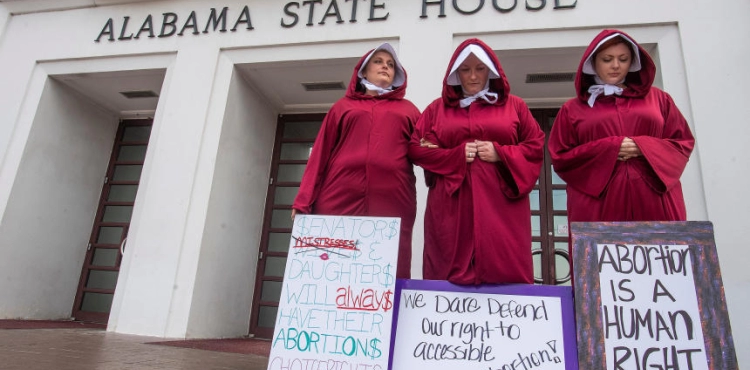The Alabama state is trying to limit abortions by passing a bill to ban action in almost all cases.
The proposed law includes a ban on abortion even in cases of rape or incest.
Proponents say they expect the law not to be passed in court, but they hope to appeal to the Supreme Court.
Prosecutors want the court, now composed of a conservative major, to repeal the 1973 legislation authorizing abortion.
Another 16 states are seeking new restrictions on abortion.
Earlier this year, the Supreme Court sentenced new abortion restrictions in Louisiana. However, the verdict was made by a small margin and the case is due to be reconsidered later this year.
Why is this happening now?
The bill´s architects expect it to fail in the courts of first instance, but they hope to ever submit it to the Supreme Court.
The move was encouraged by the admission of two conservative nominees, Trump, Neil Gorsch and Bret Cavanaugh, who are giving the nine-member panel a conservative majority.
They aim to underscore the 1973 legislation known as Rowe Versailles, which pertains to a provision in the United States Constitution to "safeguard the privacy of the private life of the individual".
"The legislation of Roe Versace and Ed should be challenged, and I am proud that Alabama is leading this movement," said Alabama Gov. Will Ainsworth.
"The judges have changed, and there have been a lot of changes during that time, and I think we´ve reached the point where we need to take a bigger and bolder step," said Eric Johnston, who founded the Alabama-based Alabama Coalition that helped draft the bill.
What in the Alabama bill?
The state Senate approved the law by 25 votes to six, and rejected exceptions in cases of rape or incest.
Some observers noted that all those who voted for the bill were men.
The draft law permits abortion only in cases where the mother´s life is in serious danger.
Doctors can face 10 years in prison for trying to abort a woman and 99 years to actually have an abortion.
The law does not carry women who abort any criminal responsibility.
The text of the bill states that abortions performed in the United States since Roe Versace´s 1973 Verdict have exceeded the number of people killed in "Nazi concentration camps in Germany, Chinese purges, the Stalin camps in the former Soviet Union, the Cambodian killing fields, the Rwandan genocide "Combined.
The bill, which is the toughest in the United States, is now expected to be presented to Republican Governor Kai Ivey for approval.
What are the restrictions imposed by other states?
Earlier this year, the governors of four states - Georgia, Kentucky, Mississippi and Ohio - signed bills banning abortion if fetal heartbeat could be monitored.
But opponents say this amounts to a ban on abortion because the fetal heart activity can be observed in the sixth week of pregnancy, meaning that early on the woman may not have realized she is pregnant.
The first such ban was issued in North Dakota in 2013, followed by a ban in Iowa in 2018. The Guttmacher Institute, which campaigns for reproductive rights campaigns, says no ban has been made so far.
But the introduction of the ban is part of the strategy to bring cases before the Supreme Court for consideration.
Twenty-eight states are currently studying legislation that bans abortion in various ways, according to the Guttmacher Institute. These include:
The ban will be automatically lifted if the 1973 legislation is repealed
Abortion at a certain stage during pregnancy, such as 6, 18 or 20 weeks
Abortion is prohibited based on the characteristics of the fetus such as sex, race or disability
Prohibition of methods of conducting certain types of abortions
What are the reactions?
Alabama Democrat Bobby Singleton said the bill "criminalizes doctors" as an attempt by men "to dictate to women what to do with their bodies."
"As if we were saying to a 12-year-old girl who might have been killed through incest or rape, she has no choice," said Rodger Smiterman, another Democratic senator from Alabama.
The National Women´s Organization called the ban "unconstitutional" and said it was "a clear effort to mobilize political support for anti-abortion candidates in the upcoming elections."
"It´s a dark day for women in Alabama and in the whole country," said Stacey Fox, a law firm for family planning in the southeast.
"They will live forever in a state of shame because of the vote and we will make sure that every woman is fully aware of who should blame," she said in a statement.
What is the possibility of abortion in the United States?
There are currently three abortion clinics in Alabama, up from more than 20 clinics in the 1990s, according to pro-choice activists.
Other states experienced similar declines in the number of abortion clinics, and in 2017, six states reportedly had only one abortion clinic.
At the same time, states with a liberal majority seek guarantees of the right to abortion in their constitutions.
But in Virginia, a Democrat-sponsored bill failed to allow abortion at any time of gestation.
In 2018, an opinion poll conducted by the Pew Research Center found that about 58 percent of the US population felt abortion should be legal in all or most cases, while 37 percent believed it should be illegal in all or most cases .












